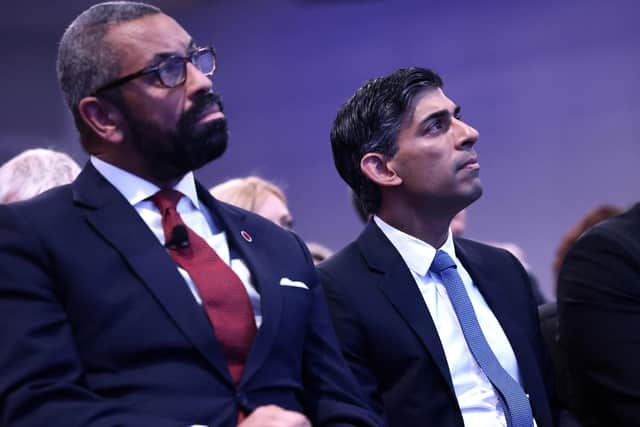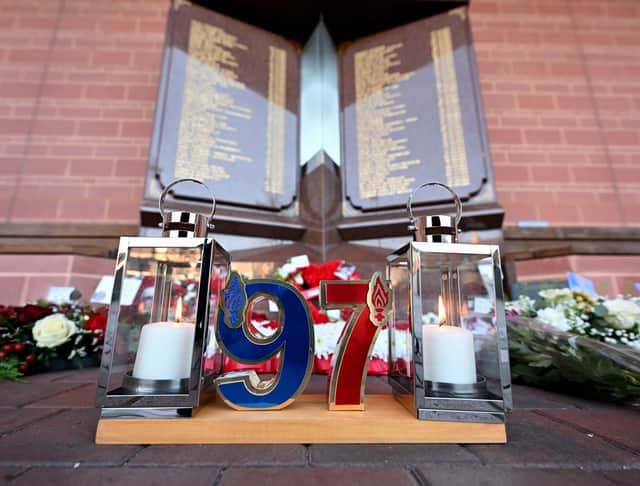Government say no to Hillsborough Law but sign up to Charter
and live on Freeview channel 276
The Government has signed a Hillsborough Charter, promising the family injustices suffered by those involved in the 1989 disaster will never be repeated, but has stopped short of introducing the Hillsborough Law called for by campaigners.
The law, known as the Public Authority (Accountability) Bill, would place a legal duty of candour on public authorities and officials to tell the truth and proactively cooperate with official investigations and inquiries.
Advertisement
Hide AdAdvertisement
Hide AdThe bill aims to ensure that families of major disasters such as Hillsborough or the Manchester Arena attack receive legal aid, and ensure the failings during investigations into the Hillsborough disaster do not happen again.
Ninety-seven Liverpool fans died as a result of a fatal crush during an FA Cup semi-final against Nottingham Forest at Sheffield Wednesday's Hillsborough Stadium on 15 April 1989.
Police, the government and parts of the media blamed Liverpool fans for the deaths. After a 27-year fight for justice by the bereaved families against the cover-up, jurors at an inquest in 2016 ruled that Liverpool fans did not contribute to the disaster and they had been unlawfully killed, with errors by the police and ambulance service causing or contributing to their deaths.
Today’s government response comes more than six years after former bishop of Liverpool the Right Rev James Jones set out 25 learning points in his report The Patronising Disposition of Unaccountable Power, following the inquests into the deaths.
Advertisement
Hide AdAdvertisement
Hide AdThe Government said it had signed up to a Hillsborough Charter, pledging to place the public interest above its own reputation, but said a "Hillsborough Law" incorporating a legal duty of candour was not necessary.
In the foreword to the report, Home Secretary James Cleverly and Justice Secretary Alex Chalk acknowledged the response had taken "too long, compounding the agony of the Hillsborough families and survivors". They added: "For this we are deeply sorry."


Prime Minister Rishi Sunak said: "The Hillsborough families have suffered multiple injustices and more than 34 years later there can never be too many apologies for what they have been through. And I want to repeat that apology today and thank the Hillsborough families for their tenacity, patience and courage."
In his 2017 report, Mr Jones called for the Government to give "full consideration" to a "Hillsborough Law" or Public Authority (Accountability) Bill, which would include a legal duty of candour on public authorities and officials to tell the truth and proactively co-operate with official investigations and inquiries.
Advertisement
Hide AdAdvertisement
Hide AdBut the response stated the Government was "not aware" of any gaps in legislation or clarifications needed that would further encourage a culture of candour among public servants in law. It is understood the Government believes that adopting the duty of candour would risk "creating conflict and confusion" because of the framework of duties and obligations already developed since the disaster.
Elkan Abrahamson, solicitor at Broudie Jackson Canter and director of Hillsborough Law Now, said: “To wait six years for a government to respond to a report about a disaster that took place 34 years ago speaks volumes. To deliver that response on a day when all eyes are on a former prime minister giving evidence to the Covid Inquiry only seeks to increase the cynicism felt amongst Hillsborough families and the thousands of others who would benefit from a change in the law.
“What we have heard from the Home Secretary today is misleadingly being characterised as a “Hillsborough Law”. It isn’t. The one relevant clause in the Criminal Justice Bill (clause 73), falls way short of what campaigners have asked for , it is not a “Hillsborough Law”, and it does not have the support of the families. It merely provides for a meaningless code of conduct for the police which does not add to what already exists. It lacks any accountability for other public servants, for national and local public services, and for private companies and their officers responsible for public health and safety. Today, of all days, when we have Boris Johnson giving evidence at the Covid Inquiry, surely demonstrates the need for more public accountability across all public services. The government is not listening to those who know only too well the barriers the state puts up when the truth is called for."
In 2021, retired officers Donald Denton and Alan Foster and former force solicitor Peter Metcalf, who were accused of amending statements to minimise the blame on South Yorkshire Police after the tragedy, were acquitted of perverting the course of justice when a judge ruled there was no case to answer.
Advertisement
Hide AdAdvertisement
Hide AdMr Justice William Davis said the amended statements were intended for a public inquiry into safety at sports grounds led by Lord Justice Taylor, but that was not a course of public justice.
In its report, the Government said the families and survivors were "entirely justified" in their frustration with the evasiveness they experienced from public officials. But it said much had changed in terms of expectations and requirements on public officials since 1989.


It said that "continuing to drive and encourage a culture of candour among public servants" was essential and an important part of the Hillsborough Charter, which Deputy Prime Minister Oliver Dowden had signed on behalf of the Government.
The charter for families bereaved through public tragedy was proposed by Mr Jones in his report, in which he said "substantial change" was needed in the culture of public bodies.
Advertisement
Hide AdAdvertisement
Hide AdLeaders of public bodies who sign up to the charter commit to place the public interest above their own reputations, approach forms of public scrutiny - including public inquiries and inquests - with candour and avoid seeking to defend the indefensible.
Other organisations which have already signed up to the charter include the National Police Chiefs' Council, College of Policing, Crown Prosecution Service and Kensington and Chelsea Council, the report said.
The Government response also states that it will consult on expanding the provision of legal aid for inquests following public disasters.